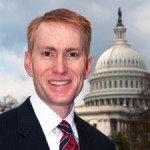 Congressman James Lankford expressed frustration after the Department of Health and Human Services (HHS) issued a Notice of Proposed Rulemaking (NPRM), which attempts to clarify the definition of a religious institution. It also attempts to accommodate religious objections to the recent regulations that employers must provide their employees contraceptives at no cost.
Congressman James Lankford expressed frustration after the Department of Health and Human Services (HHS) issued a Notice of Proposed Rulemaking (NPRM), which attempts to clarify the definition of a religious institution. It also attempts to accommodate religious objections to the recent regulations that employers must provide their employees contraceptives at no cost.
“The Administration now understands that the contraceptive regulation invented last year by Health and Human Services (HHS) is a clear violation of the First Amendment right to religious freedom for some businesses,” said Chairman Lankford. “The new definitions and accommodations establish a redefined level of religious freedom Americans may expect under this Administration, if their religious preferences differ from the President’s.”
The HHS regulation (2013-02470), which could change at the whim of any future Administration, establishes essentially three categories of religious institutions. Two of the institutions have some religious protection. One type of institution has little or no religious protection.
“The Administration has instructed religious private businesses (like bookstores or gift shops) in America that if their religious preferences don’t match the Administration’s religious preferences, the business owners can face fines or business closure,” continued Lankford. “Apparently, in America some people have more religious freedom than others.”
Currently, private businesses face a $100 per person, per day fine if their religious practice does not align with the Administration’s doctrine. In an obvious targeting of religious businesses, business owners who do not agree with the entire government mandate for health care will face a $2,000 per person, per year fine, but if they only disagree with the Administration’s religious views on health care, they will face a jaw-dropping $36,500 fine per person, per year.
“It is clear this Administration demands orthodoxy to its religious preferences and is not willing to tolerate anyone who objects to its religious view,” said Lankford. “This policy sets a troubling standard for future religious practice in the public square. Allowing churches to be exempt but not allowing people of faith and their business to be exempt is a confinement of faith to the church building. Faith is at its best when it leaves the church property and penetrates into our lives,” concluded Lankford.


